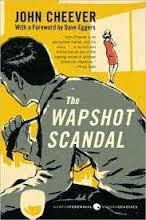
John Cheever is famous as a writer of short stories, and as I am not much of a fan of the short story, I have long avoided him. I am however increasingly desperate for new books to read, and having decided to start fishing around in the smaller fish of the twentieth century, have pulled him out. This is one of his few novels, and I’m glad I tried it.
The book is the sequel to a novel called THE WAPSHOT CHRONICLE, and tells the story of the grown up children of a family leading their adult lives. It’s mostly about relationships, and in true mid-twentieth century male writer fashion, all the marriages are prisons. To which I say, as to my friend Updike: JUST GET A DIVORCE ALREADY AND STOP WHINING
That said, it’s very well observed. Here’s a shopkeeper : “Now and then he patted his paunch – his pride, his friend, his solace, his margin for error”
And here’s a meditation on travel: “Travel has lost the attributes of privilege and fashion. We are no longer dealing with midnight sailings on three-stacked liners, twelve-day crossings, Vuitton trunks and the glittering lobbies of Grand Hotels. The travelers who board the jet at Orly carry paper bags and sleeping babies, and might be going home from a hard day’s work at the mill. We can have breakfast in Paris and be home, god willing, in time for dinner . . .”
It’s also often weirdly poetic: “What does the sea sound like? Lions mostly, manifest destiny, the dealing of some final card hand, the aces as big as headstones . . . . The sea grass dies, flies like a swallow on the wind and that angry looking tourist will make a lamp base out of the piece of driftwood he carries. The line of last night’s heavy sea is marked with malachite and amethyst, the beach is scored with hte same lines as the sky; one seemed to stand in some fulcrum of change, here was the barrier, here as the wave fell was the line between one life and another, but would any of this keep him from squealing for mercy when his time came?”
And here’s a obituary I would enjoy: “She had not only lived independently, she had seemed at times to have evolved her own culture”
Dave Eggers, of A HEARTBREAKING WORK OF STAGGERING GENIUS fame adores this book, and comments in the Introduction: “. . . it’s hard to believe a man wrote these sentences, and not some kind of freakish winged book-writing angel-beast or something”. I’m not sure I’d go that far, but I certainly enjoyed the novel.
